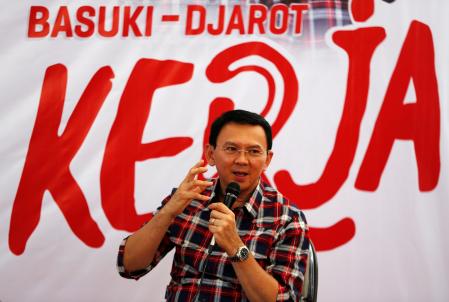
By Agustinus Beo Da Costa and Kanupriya Kapoor
JAKARTA (Reuters) – Indonesian police on Tuesday considered a blasphemy case brought by Muslim groups against the Jakarta governor, the first ethnic Chinese and Christian in the job, as religious tension simmers and President Joko Widodo tries to keep a handle on security.
Police in the world’s biggest Muslim-majority nation are expected to decide this week on whether to pursue the case against Basuki Tjahaja Purnama, nicknamed “Ahok”, amid demands by hardline Muslims that he resign over accusations he insulted the Koran.
“We will continue the investigation if we have enough evidence. Or, if it is considered not to be a criminal case, it will stop,” said Ari Dono Sukmanto, chief of the national police criminal investigation department.
A decision to drop the case could spark mass protests led by hardline Muslims against not just Purnama but also Widodo, who is seen as a key backer of the governor.
The blasphemy allegations centre on a speech Purnama made in September, when he said his opponents had deceived voters by attacking him using a verse from the Koran.
A social media user edited and subtitled a video of the speech but omitted a key word in the subtitles so it appeared the governor was criticising the Koran rather than his rivals, police say.
The video went viral and incensed moderate and hardline Muslim groups alike. Police are investigating the social media user and have questioned up to 70 witnesses in the case against Purnama.
Widodo, who has tried to distance himself from Purnama, has repeatedly called for calm and met with top religious, security, and political leaders to discuss the issue.
“We want to remind everyone that this country is one of diverse ethnicities, religions, races and languages,” he said on Tuesday in the latest of several speeches on the subject made to security forces.
Rights activists have said a decision to pursue the case against Purnama could set a precedent for persecution of religious minorities.
Indonesia recognises six religions and is home to several minority groups that adhere to traditional beliefs.
In the biggest protest Jakarta has seen in years, more than 100,000 Muslims marched against the governor this month, calling for his resignation and urging voters not to reelect him in February.
One protester was killed and more than 100 were wounded, police said, when the demonstration turned violent.
Purnama, a Protestant, once hugely popular for his tough, reformist approach to running the city of 10 million, has seen his support plummet amid the controversy.
But he remains ahead of his two rivals and around a third of voters remain undecided, an opinion poll showed last week.
Habib Rizieq, spiritual leader of the hardline Islamic Defenders Front, one of the organizers of the last protest, said on Tuesday his group and others may march again depending on the outcome of the police hearing.
Widodo has urged police and the military in all parts of the archipelago to step up security as social media continues to buzz with anti-Purnama sentiment and incitement to violence.
Two attempted attacks on a church, which killed an infant, and a Buddhist temple in Borneo island this week have highlighted religious divisions in the country, though authorities have not tied the events to Purnama’s case.
(Writing by Kanupriya Kapoor; Editing by Nick Macfie)
